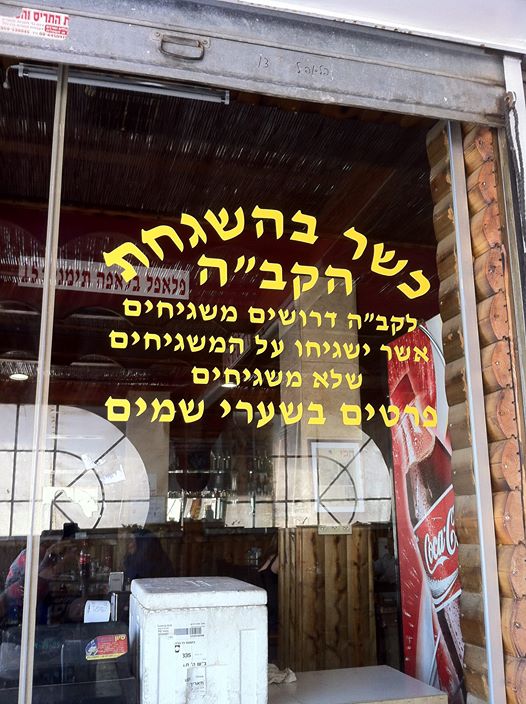What Makes an Eatery Kosher?
|
HaArets 2 Nov 2012 A number of coffee houses and restaurants in Jerusalem, have decided they no longer want the rabbinate's kashrut supervision yet they still maintain all the Kosher regulations and advertise themselves as being Kosher. The rabbinate however argues that this violates the law that no business may present itself in writing as kosher unless it is under the rabbinate's supervision, even if it has some form of private kashrut supervision. Now, an Orthodox rabbi, Rabbi Aaron Leibowitz, supports them in their battle with the Chief Rabbinate. "I think it is the right of every Kosher place to identify themselves as Kosher, even if the Rabbinate does not certify them as Kosher." |
|
Leibowitz, an Orthodox rabbi from Jerusalem, has also recently led a trial project to provide free Kashrut supervision to a neighbourhood cafe in downtown Jerusalem. Today, he will participate in a first-of-its-kind demonstration against the Jerusalem Rabbinate. The rally is sponsored by Yerushalmim, a group of Jerusalem social activists that includes both religious and non-religious members. Yerushalmim's demonstration, to take place along with a press conference in the capital's Rehavia neighborhood this afternoon, was called to protest the rabbinate's campaign. The slogan for the rally is a pun on the name of the popular song "Mashiah Lo Ba" ("the Messiah isn't coming" ): It has been changed to "Mashgiah Lo Ba," meaning "the kashrut supervisor isn't coming." "The time has come to push alternatives to the monopoly of the rabbinate, which excludes and discriminates in the kashrut business," one of the demonstration's organizers said. Leibowitz, who will speak at the rally, agreed: "I do not intend to incite against the law, but I am coming to say the law is unjust." Leibowitz and the Yerushalmim activists have for some time been working far from the public eye on a community model for free alternative kashrut supervision. The neighborhood kashrut model is based on a policy paper written by Jerusalem resident Haya Gilboa. Five businesses in the center of the city were involved in the talks, but only one has been willing to take the final step: the Salon Shabazi cafe in the Nahlaot neighborhood. The cafe has just begun the project, under which it will place itself under strict kashrut supervision by supervisors living in the neighborhood. Leibowitz wants Salon Shabazi to meet the strictest kashrut requirements, a sort of anarchist version of the rabbinate's mehadrin kashrut standard, its strictest level of supervision. Leibowitz's involvement is noteworthy because he is not involved in or identified with any of the more liberal Jewish movements. He was born in Berkeley, California and has been a community activist in Nahlaot for years. He heads the Sulam Yaakov Yeshiva as well as a community with hundreds of families, most of whom are English-speaking immigrants. Many members of his community have "broad horizons," he said. Many describe themselves as neo-Hasidim or "national ultra-Orthodox" and are drawn to the ideas and music of the late Rabbi Shlomo Carlebach. Six students in Leibowitz's yeshiva, who are studying for rabbinical ordination from the Chief Rabbinate, have volunteered to be the cafe's kashrut supervisors - for free. The owner will allow them full access to every part of the business. But Leibowitz says what is no less important is that the kitchen will be open to anyone to inspect, including customers. "This shifts the burden of responsibility to the customer," he said. "The customers will have to learn that it is not enough that it is written [the restaurant is] kosher; they must investigate who says it is kosher." Jerusalem restaurants that have rebelled against the rabbinate include Carousela, Topolino, Azura, Ichikidana and others. Some gave up their kashrut certificates for ideological reasons, others complained of the impossible demands placed on them. But all these restaurants want the public's trust and insist they keep the rules of kashrut down to the smallest detail. It's not clear how many people who keep kosher now avoid these eateries. What is clear, however, is that all of them still have a regular skullcap-wearing clientele. At Azura, a meat restaurant in the Mahane Yehuda market, there are even a few customers in ultra-Orthodox dress who eat there despite the lack of any type of kashrut certificate. Recently, inspectors visited these restaurants and warned the owners they were violating the law by presenting themselves as kosher without an official kashrut certificate from the Rabbinate. Azura has already been hit with a NIS 1,000 fine for representing itself as kosher on its website. As to whether owners may tell customers verbally that the place is kosher, that is currently under dispute with the Rabbinate. The battle over private kashrut supervision can be seen as part of a broader struggle by young Orthodox people who are moving away from the religious establishment. They still want to keep Jewish law, but without the intervention of official state religious bodies such as the Rabbinate, the Hevra Kadisha burial societies and the religious courts. This has also led some to hold private weddings that aren't registered with the Rabbinate and state, as well as private conversions, divorces and funerals. |



